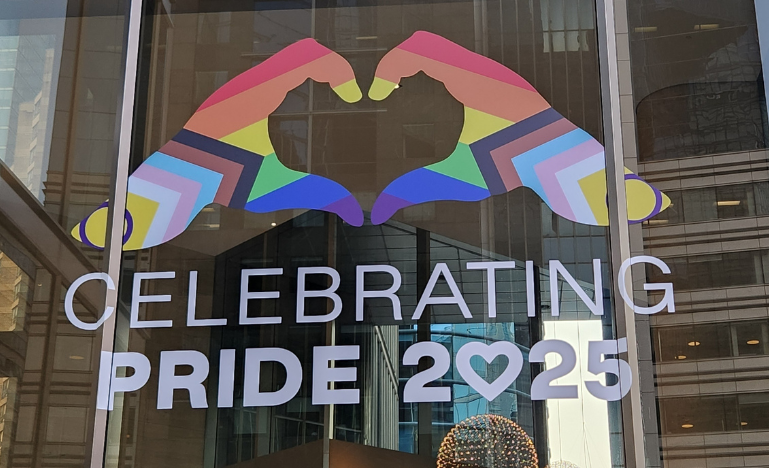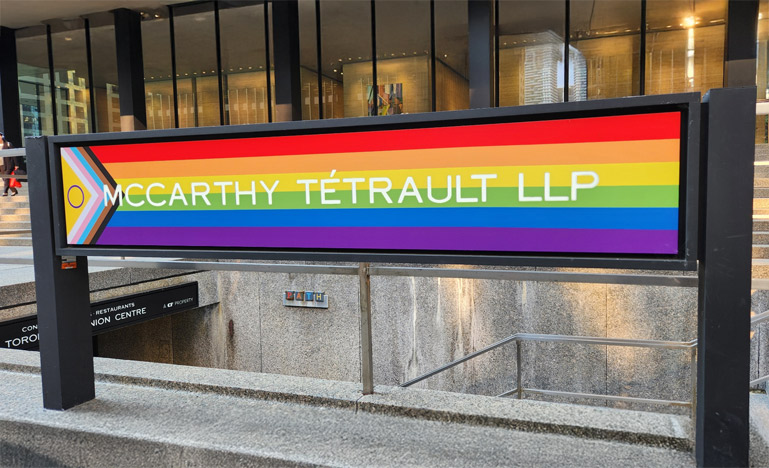Showing up in a straight world
How 2SLGBTQ+ leaders in the legal profession harnessed their backgrounds, personalities, and opportunities to move the needle forward

Every day we hear stories of how the backlash against diversity, equity, and inclusion impacts the 2SLGBTQ+ community. That comes as large law firms in the United States pull back on their diversity, equity, and inclusion (DEI) initiatives, sign deals with the Trump administration in which they commit to refrain from engaging in “illegal DEI discrimination and preferences,” and amid the general all-out war against transgender people.
Most Canadian law firms, on the other hand, appear more committed to staying the course and upholding their DEI activities. During Pride season, this means, among other things, lots of parties mixing fun, advocacy, and fundraising.
However, even with visible signs of support from employers—like the ‘rainbowing' of firm logos—many queer professionals, especially those from marginalized backgrounds, conservative small towns and difficult families, still can’t be their full selves at work and are holding back, says Jeremy Long, a Vancouver-based leadership development coach.
The result is employees who spend significant energy code-switching and masking their true selves to fit into professional environments instead of directing that energy into being influential and doing great work. It’s extra stress and effort for many queer people to show up powerfully in a straight world.
“It’s a mess because there's all this untapped potential in underrepresented leaders, queer people specifically, because we have learned how to be really in tune with our environments,” he says.
“Queer people have an untapped skill of emotional intelligence and social awareness because we know how to read for danger. When that’s leveraged, it can be so helpful in communication, stakeholder management, and navigating conflict.”
Long suggests that understanding and working through one's inner narrative, finding supportive communities, and gradually building confidence are key to overcoming the fear of speaking up in professional settings and establishing one's path to leadership.
National spoke with a cross-section of 2SLGBTQ+ leaders in the legal profession to see how they harnessed their backgrounds, personalities, and opportunities to move the needle forward. They are:
Steeves Bujold (Montreal) Partner and chief inclusion officer at McCarthy Tétrault. He was the first president of the Canadian Bar Association with a same-sex partner. Called to the bar in 1999.
Jennifer Mathers McHenry (Toronto) Founding partner of Mathers McHenry & Co. Was one of the driving forces behind Ontario legislation giving parents who aren't biologically related to their children — such as same-sex partners who use sperm donors and other reproductive technologies — the same legal rights as heterosexual parents. Called to the bar in 2005.
Lee Nevens (Vancouver) Senior counsel, Department of Justice. First trans lawyer to become president of CBA-BC. Called to the bar in 2013.
Douglas Judson (Fort Frances) Founding partner of Judson Howie. Former municipal councillor and president of the Federation of Ontario Law Associations, founder of the Law Students’ Society of Ontario, and co-founder of Borderlands Pride. Called to the bar in 2016.
Mathias Memmel (Toronto) Associate at Fasken. President of Start Proud and a co-founder of the Canadian Association of 2SLGBTQ+ Lawyers. Called to the bar in 2023.
We asked them about leadership and their careers. For almost all of them, success extends beyond traditional metrics of billable hours and partnership tracks to making an impact in their community.

Being yourself
Lee Nevens said their pull towards community service was first inspired by their time in the Royal Canadian Air Cadets, whose motto is To Learn – To Serve – To Advance. While they were out as queer at university and during their early years in the bar, and a leader in the 2SLGBTQ+ community, they felt much more confident professionally after coming out as trans and non-binary mid-career. Nevens says they no longer had to spend time and energy "masking" their true self.
“I kind of had a little bit of an aha moment when I introduced myself for the first time using [they]."
Steeves Bujold says he’s always been very sensitive and initially thought it was a weakness to be a litigator with a lot of empathy.
“But I realized that when you're authentic, when you're out, you can be yourself in the space of the law firm. Then you can use that authenticity and that empathy. It is such a powerful quality, because you can read people.”
Jennifer Mathers McHenry says she was “raised to have a somewhat absurd sense of confidence," and was long set on a career in law.
“It genuinely doesn't occur to me to do anything else. This is who I am. I know what I'm good at. My sexual orientation and identity have nothing really to do with that, but it's also part of who I am.”
What is success and leadership?
Mathias Memmel defines leadership as challenging romanticized notions of success and helping people understand what truly fulfills them, rather than just pursuing a prestigious career path.
“My approach to leadership largely starts from a position where I want to provide an environment and foster an environment where people feel comfortable speaking up,” he says.
Douglas Judson grew up in a family in northwestern Ontario that was very involved with their church and community. He says that taught him that leadership involves showing up, doing the grunt work and whatever else is necessary. All that has informed his leadership approach, which he describes as "being unyielding in advocacy, despite potential social consequences."
When he became president of CBA, Bujold says he realized he was at a point in his career where he could significantly impact others as a role model, listening to and supporting them and creating space.
“You don't know as a leader the kind of influence you have on others, but just the fact that you're there, that you're talking, that you're mentioning things…it sends a strong message.”
The push toward leadership
Nevens grew up as a “welfare kid” who saw a lot of injustice to all kinds of people all around them. That experience spurred their determination to work for change.
“I've always been driven to try to improve things for our communities and our society, and that includes both the queer and trans ones, but also the broader ones,” they say.
Growing up around “incredibly strong women” shaped Mathers McHenry into who she is today. She says her grandmother and great-grandmother did what they had to do to look after their families and succeed.
“If things are not good, you take on that information and you pivot. Of course, you're capable, and you figure it out.”
Even though he grew up in rural southwester Ontario, Memmel says supportive and open-minded parents who provided an environment where queer relationships were normalized were integral to his sense of commitment to creating inclusive spaces for diverse perspectives.
For Bujold, the push came from former McCarthy CEO Dave Leonard, who wanted him to lead the firm’s pride action group and later urged him to run for the CBA presidency. Bujold didn’t jump right in, questioning if he wanted to define himself as “a gay man on the national platform,” but Leonard’s support propelled him forward.
“It was great in so many ways. I grew and personally it challenged me, but it forced me to learn about our history and the legal battles that were fought in the past that we take now as granted,” he says.

Role models matter
Memmel says more senior bar members, such as Nikki Gershbain, Adam Goldenberg, Tracey Doyle, and Katherine Pollock, gave him the hope and courage to be a public leader on controversial issues.
When Bujold started practising law in 2001, there were few openly gay lawyer role models. But he came out when he joined McCarthy because he was inspired and supported by his mentor, David Platts, who was openly gay early in his career and went on to become a Quebec Superior Court judge.
Judson says Douglas Elliott and Paul Saguil provided guidance and comfort in his advocacy work and showed him the value of principled leadership.
For Nevens, supportive mentors, “in particular the cisgender queer mentors” like barbara findlay, were very important. Those supporters “understand the struggle of being a first in many cases and can relate to the challenges faced by queer lawyers through similar experiences and attacks from previous generations,” they say.
Fostering leadership in others
Mathers McHenry says she opened her firm six years ago to create a practice that “valued excellence and humanity.” For her, billable hour targets are important, but not everything.
“Everybody gets to contribute differently, depending on their skill set and interests and all of those things,” she says.
Judson has been able to be “ungovernable” because he created his own firm, which allows him to advocate freely. He encourages new lawyers who want to do the same to get a strong foundational practice at reputable firms to develop their skills. While advising those early in their careers to seize opportunities that energize them, Judson always cautions them to be prepared for their advocacy to be unpopular and attract criticism.
The path forward
Bujold says that if you allow everyone to come as they are, they will be happier, more engaged, and more successful.
“They will walk on fire for you,” he says.
“And then that's how you become successful as a law firm, legal department, and solo practitioner.”
Nevens says a big part of being president of CBA-BC is simply showing up as themselves in spaces that have not seen a trans person before.
“I'm very open about who I am. I talk about it. I say my pronouns at the beginning of most of my speeches, even though the successive topics are often nothing to do with my identity. But the mere act of existing openly as a trans person in these spaces, I think, has made a difference right in the legal community in B.C.”
Taking some agency in your career and asking yourself the right questions is the most important advice Mathers McHenry gives any young lawyer trying to figure out their path. She says it’s not about Big Law or not Big Law; she encourages people to ask: “What are the areas of law that I'm really interested in? What do I want my day to look like? What kind of people do I want to work with? How much do I want to work? How much money do I need? What kind of lifestyle am I looking for?”


